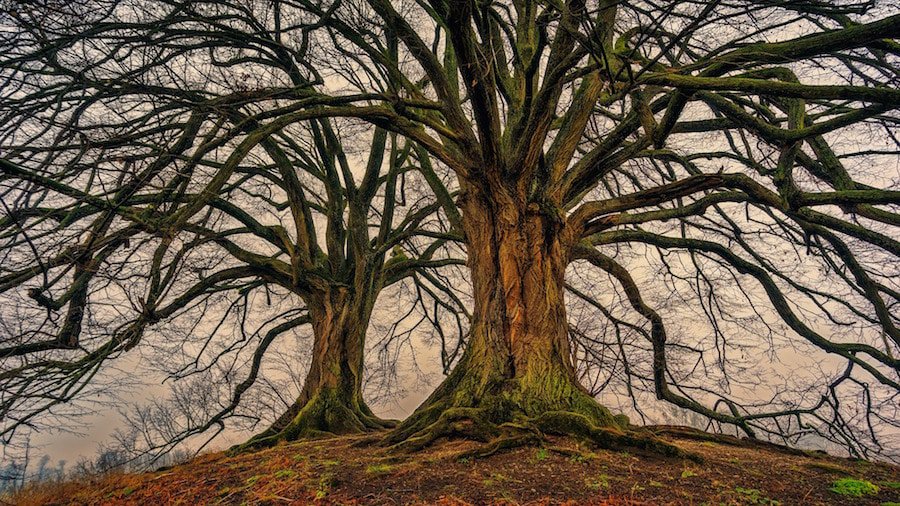木字旁 (mù zì pang) or the tree radical, is seen in many Chinese characters with a ‘natural’ meaning such as trees 李子 (lǐ zi) plum tree, fruits such as 橙子 (chéng zi) orange and even wooden objects, such as 柜子 (guì zi) cabinet. It can also be seen in less obvious characters, some of which are featured below.
Here are some of the characters featuring 木字旁: The Tree Radical:
来 / 來 (lái) to come / to arrive
The character of 来 (lái) is a combination 木 (mù) wood/tree and 米 (mǐ) rice. Originally a character that looked more like 禾 (hé) the pictographic character for grain, it was said that a good crop of grain was a blessing having ‘come’ from above and the character soon came to mean ‘come’.
出来 (chū lái) to come out
过来 (guò lái) to come over
爸爸还没下班回来吗? (bà ba hái méi xià bān huí lái ma?) Hasn’t Dad come back from work yet?
她从北京来到深圳工作。 (tā cóng běi jīng lái dào shēn zhèn gōng zuò.) She came from Beijing to work in Shenzhen.
村 (cūn) village
村 is a fairly simple character meaning ‘settlement amongst the trees’. The phonetic 寸 (cùn) part of the character relates to small measurement which could also be suggestive of the settlement size.
农村 (nóng cūn) rural area
村民 (cūn mín) villager
这是一条贫困的小村。 (zhè shì yì tiáo pín kùn de xiǎo cūn.) This is a small, poor village.
村子里的年青人都希望去城市里工作。 (cūn zi lǐ de nián qīng rén dou xī wàng qù chéng shì lǐ gōng zuò.) = All the youngsters in the village hope to work in the city.
果 (guǒ) fruit
Earlier forms of this character had much more fruit, but even in its simplified form 果 is a very literal pictograph character showing fruit on a tree.
如果(rú guǒ)if
结果 (jié guǒ) outcome
他去市场里买了很多水果。 (tā qù shì cháng lǐ mǎi le hěn duō shuí guǒ.) He went to the market and bought lots of fruit.
这棵树上结了很多果实。 (zhè kē shù shàng jié le hěn duō guǒ shí.) A lot of fruit has grown on this tree.
林 (lín) woods / forest
林 is also an obvious pictograph character, with 2 trees standing side by side this suggests many trees or a wood. Combine with the character 森 (sēn) for 森林 and that gives us a massive amount of trees or forest.
森林 (sēn lín) forest
密林 (mì lín) jungle
森林里住了很多动物。 (sēn lín lǐ zhù le hěn duō dòng wù.) There are many animals living in the forest.
他们想去森林探险。 (tā men xiǎng qù sēn lín tàn xiǎn.) They wanted to explore the forest.
本 (běn) root / origin
本 combines 木 with a stroke at the base suggesting the ground level. Below this are the roots and here we derive our meaning of origin, source, roots. 本 is also an important classifier for books 一本书 (yì běn shū), as a source or root of knowledge.
基本 (jī běn) basic
本来 (běn lái) original
我本来就不想去那里。 (wó běn lái jiù bù xiǎng qù nà lǐ.) I didn’t want to go there originally.
她本人比照片好看。 (tá běn rén bǐ zhào piàn hǎo kàn.) She looks better than in the photo.
杯 (bēi) cup
The character 杯 is used frequently as it also a classifier for containers of liquids. Originally, of course, drinking vessels would probably have been made from wood, which may be why 木 is the radical for this character.
酒杯 (jiǔ bēi) wine glass
杯子 (bēi zi) cup / glass
你一天要喝多少杯咖啡? (nǐ yì tiān yào hē duō shǎo bēi kā fēi?) How many cups of coffee do you drink in a day?
他昨天不小心摔烂了杯子。 (tā zuó tiān bù xiǎo xīn shuāi làn le bēi zi.) Yesterday he accidentally broke the cup.
末 (mò) tip / end
The character 末 is almost the reverse of 本, where the additional stroke at the base of the character suggests ‘roots’, the opposite can be seen in 末, which shows an additional stroke at the top of the character suggesting the tip or end.
周末 (zhōu mò) weekend
期末 (qī mò) end of term
他要在月末还清债务。 (tā yào zài yuè mò huán qīng zhài wù.) He needed to pay off the debt at the end of the month.
我打算周末去沙滩玩。 (wó dǎ suàn zhōu mò qù shā tān wán.) I plan to go to the beach at the weekend.
未 (wèi) not yet
This character is similar to our previous character 末 (mò). Whilst the additional stroke in 末 (mò) is long, the top line in the character 未 (wèi) has ‘not yet’ grown to its full length and often refers to immaturity or youth. Look in our example sentences for 未来 (weì lái), the character for future, something that has not happened yet.
未来 (wèi lái) future
从未 (cóng wèi) never
是时候考虑一下你的未来了。 (shì shí hòu kǎo lǜ yí xià nǐ de weì lái le.) It’s time for you to consider your future.
祝你有美好的未来。 (zhù ní yǒu méi hǎo de weì lái.) Wish you have a bright future.
